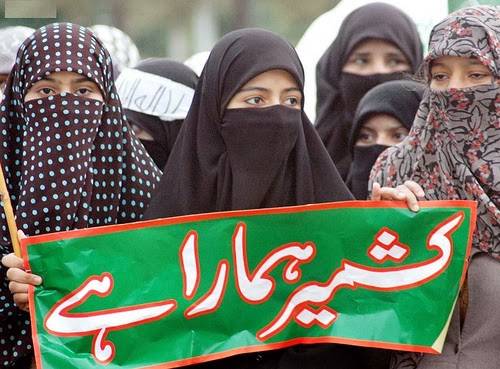Malala, a Pakistani citizen, cannot visit Pakistan. Lower middle-class industrialised Muhajirs and ethnic Balochs are being massacred by the state. Secular political parties – that bear the brunt of both Western and Pakistani media coverage – can only operate in London as opposed to their home country. Yet the Pakistani state wants an influx of 5 million Kashmiris (ISI seems to have already granted them honorary citizenship) so that Jihad Fi Sabilillah can be established and victory can be achieved. Of course, Nawaz pretends it’s not about Jihad but his passion for human rights.
Recently, I spoke to a kid who was once a student at an elite and Westernised school in Pakistan (speaking Urdu even during breaks is punishable by a detention at such schools). I was surprised that he couldn’t even take a casual joke on the Kashmir issue. He remarked, “Kashmir does not want to be a part of India.” Amused, I retorted in my usual tongue-in-cheek tone: “Precisely. Kashmir is a natural part of Pakistan and Kashmiri Pandits must pay jizya.” The guy was a non-partisan Muhajir. Obviously, non-partisan quintessential burgers are easily swayed by PTI’s futile hyper-nationalism. If they are fortunate enough to see through the sheer stupidity of PTI Youthism then Musharraf soundbytes (‘Musharraf Saved the Economy!'; ‘Musharraf is a Hero!'; ‘Musharraf was a Liberal!’) seem to work fine. But even for the cream of Pakistan, why exactly Kashmir? So often in intellectualised debates within international relations theory, we must decipher the root cause of security dilemmas between two or more states. Why does a revisionist state like Pakistan want more than it can cope with? Here are a few hypotheses as to why Denialistanis love Kashmir:
Geographical aesthetics hypothesis. REJECTED: Pakistan already has most of the Northern regions– all of which probably much more beautiful than a now war-torn Kashmir… but apparently ‘Paradise on Earth’ must be conquered.
Cultural hypothesis.REJECTED: Even inhabitants of Pakistani-administered Kashmir (Azad Kashmir) do not speak the same language as Kashmiris. The former are generally Potoharis – they are linguistically, culturally and ethnically closer to [Northern] Punjabis. On top of this, ethnic Kashmiris had nothing to do with the Pakistan Movement.
Historical ties hypothesis. REJECTED: Since Pakistanis are mostly Muslims and believe in the idea of the Ummah, apparently before the downfall of the Ottoman Caliphate we Muslims all lived happily ever after. This could not be far from the truth. The Kashmiris had their own history and culture, separate to that of other Muslim groups like Mughals, Pashtuns and Punjabis.
‘Nawaz Sharif human rights’ hypothesis.REJECTED: This does not take into account that if Pakistan wouldn’t keep initiating wars with India over Kashmir, then human rights violations in Kashmir on the part of India would most likely lessen automatically. Secondly, if Pakistanis love Kashmir because they care about human beings, then they would stop killing current citizens first.
‘Only Pakistan can seriously administer Kashmir’ hypothesis.REJECTED: Even Azad Kashmir isn’t properly administered by Pakistan. The people of Azad Kashmir are Potoharis and very Pakistani, yet they have shown themselves to be capable of reforming their own region without the help of the Pakistani state. If Pakistan can’t control Azad Kashmir, how will it control Indian-administered Kashmir?
‘If America can be a hegemon and Israel can defy international law, so can Pakistan’ hypothesis.REJECTED: This certainly explains Pakistan’s constant revisionism, but it doesn’t explain why exactly Pakistanis love Kashmir in particular.
Ideology (Islamism) hypothesis. REJECTED: There is obviously an overarching ideological drive (Jihad is the Pakistani army’s convenient ideology). However, if it was purely about Islam, then why not desire an influx of Muslims from Hyderabad, UP or CP or the Biharis of Bangladesh?
‘Pretty fair-skinned barbarians’ hypothesis:ACCEPTED: It sounds shallow to judge others by their appearance, but we know most Pakistanis are pretty shallow. In the confines of academic rigour and political correctness, the ‘pretty fair-skinned barbarians’ hypothesis has been dismissed as a childish attempt to promote racial realism. But the fact is, the Pakistani mind just can’t get enough of pretty fair-skinned barbarians. I mean… I like my men tall, dark and handsome (and somewhat modern!). But just take a look at Pakistani dramas as they try to romanticise village life. Take a look at Lollywood as it hires the fairest skins from Heera Mandi. The Sufi traditions so popular in both urban and rural centres always have fair-skinned barbaric pirs to represent them. This includes Abida Parveen. Secular, industrialised people always lose out in Pakistan.
British cultural critic and psychiatrist Theodore Dalrymple writes, “Stereotyping is inevitable in complex societies in which not everything can be known about every individual.” When we look at Kashmiri Muslims in Kashmir from a macro lens, it is clear why Kashmiri Muslims – despite a lack of a shared history and language – are so appealing to Pakistanis: gora rang, coupled with a literacy rate of 50%, a penchant for Sharia and an obstinate preoccupation with traditional norms and folklore, the oppressed Kashmiris are to be welcomed with open ‘arms’ (no pun intended) in Pakistan.






